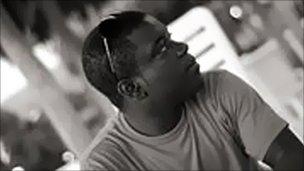UBS did not notice Adoboli's £1.3bn loss
- Published
- comments

Mr Adoboli's last comment on Facebook was 'I need a miracle' (Photo shows Kweku Adoboli on Facebook)
I have learned that UBS's internal controls did not pick up the massive loss allegedly generated by its trader Kweku Adoboli.
The course of events was that on Wednesday Mr Adoboli disclosed to UBS that he had engaged in unauthorised trades, in his role as part of UBS's so-called Delta One trading team, which deals in exchange traded funds (or tradable investment funds whose proliferation has concerned regulators).
UBS then examined his trading positions and rapidly informed the Financial Services Authority and the police. Mr Adoboli was arrested by the police at 3.30am yesterday.
The disclosure that it was Mr Adoboli's decision to inform his colleagues of his actions that set alarm bells ringing at UBS, rather than its own monitoring system, will add to concerns that investment banks simply aren't capable of controlling the huge risks that their traders take.
UBS estimates that Mr Adoboli's alleged unauthorised trading will cost the bank around $2bn (£1.3bn) and will more than wipe out the giant bank's profits in the current three-month period.
If Mr Adoboli had not revealed his activities on Wednesday, in theory the final bill for UBS could have been even bigger.
Mr Adoboli has been arrested on suspicion of being involved in "fraud by abuse of position".
His last published comment on Facebook, prior to being arrested, was "I need a miracle".
UBS this morning refused to comment, when I put it to them that their internal systems had not uncovered the unauthorised trades.
Update 0850: The Financial Services Authority, the City's regulator, is investigating why UBS failed to identify the unauthorised transactions that the bank says will generate an eye-watering $2bn loss.
The big question is whether there is something peculiarly inadequate about UBS's monitoring system - or whether the apparent flaw might be present in the monitoring systems of other big banks.
Update 1122: I have two important developments to disclose.
First that the Swiss government is putting intense pressure on UBS to separate or close its investment banking operations.
Even separation would have profound ramifications, in that a separated investment bank would be deemed by creditors and investors as much riskier than the current integrated, universal-banking form of UBS.
It would become much more expensive for a standalone investment bank to finance itself, which would put pressure on the bank to cut costs by shrinking significantly.
That the Swiss authorities should be losing patience with UBS is no great surprise, since the giant bank lost £35bn in the banking crisis of 2007-8, and had to be rescued by Swiss taxpayers.
Bankers at UBS are aware of the push from the Swiss government for a major overhaul of the bank and are concerned.
The second important development is that over a period of time Mr Adoboli's colleagues had suspicions about his transactions. They apparently raised some of these suspicions with him. But it wasn't till Wednesday that he gave them the relevant information.
This raises even more questions about UBS's internal control systems. If Mr Adoboli's colleagues had personal doubts about his deals, why were they unable to get to the bottom of what went on without relying on evidence provided by him?
One banker described UBS's inability to see what Mr Adoboli was doing as quite extraordinary.